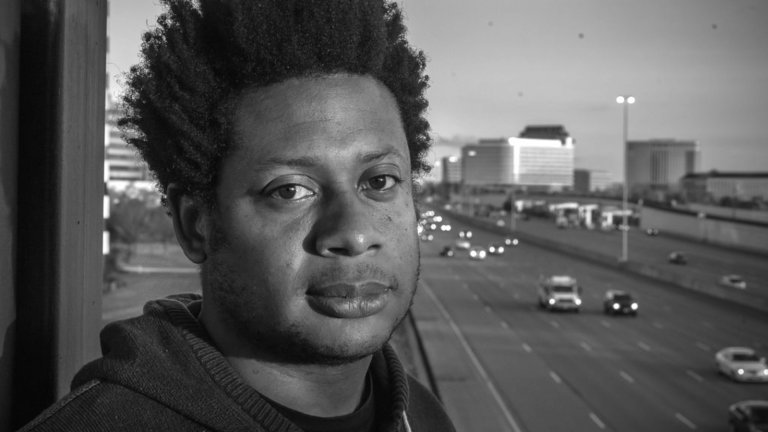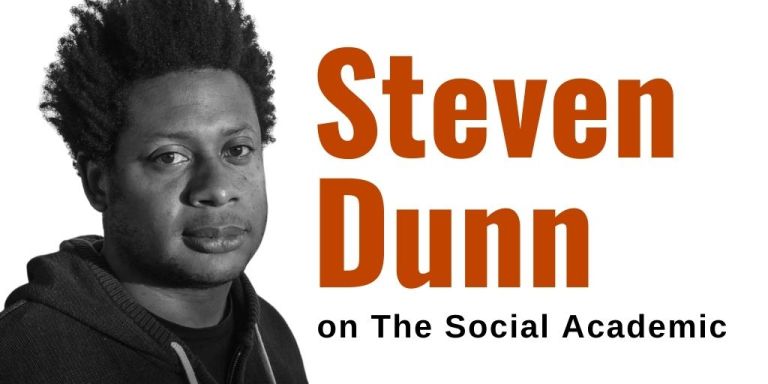Writer Steven Dunn Talks Facebook and Community
Novelist Steven Dunn loves Facebook


Steven Dunn, author of Potted Meat (2016) and water & power (2018), is great at Facebook. So I was surprised when back in January I saw him post about struggling with personal branding online.
Steven’s Facebook posts are so good he’s been invited to read and talk about them. Since he’s is the first person that comes to mind when I think of building community on Facebook, I reached out.
Today, Steven Dunn joins me to talk about
- Being a novelist and teacher
- How he loves conversations on Facebook
- Why being himself is so important on social media
- Personal branding for writers
- Advice for you!
Subscribe to The Social Academic blog.
The form above subscribes you to new posts published on The Social Academic blog.
Want emails from Jennifer about building your online presence? Subscribe to her email list.
Looking for the podcast? Subscribe on Spotify.
Prefer to watch videos? Subscribe on YouTube.
Meet Steven Dunn
Subscribe to the interview series on Spotify | YouTube | TuneIn | ListenNotes | Blubrry
Jennifer: Hi everyone. Today I am talking with writer, Steven Dunn. We’re going to talk a little bit about Facebook because that’s something that he is amazing at.
So we’re going to get into social media, writing, and personal branding for writers which is kind of a contentious issue. So we’re going to talk about that and why writers like myself, writers like Steven struggle with that.
So first, Steven, would you mind introducing yourself to everyone?
Steven: Yeah. Hey, everybody, I’m Steven Dunn.
I’m a novelist and a teacher at Regis University. And I will be teaching at Cornell College, both of their MFA’s pretty soon.
I have two novels out. One is Potted Meat, and one is water & power.
Jennifer: Awesome.
Steven: And I’m from West Virginia. I have to make sure to say that because I grew up in a poor place as a black person.
Jennifer: You’re based in Denver now, right?
Steven: Yeah. Yeah. I live in Denver now. Yeah.
Jennifer: Got it. Well, that’s how we know each other from Naropa University’s Summer Writing Program (SWP) and all of the awesome events and things that are surrounding that.
Steven: Is that where we met?
Jennifer: It is where we met initially. But I think we’ve been connected since then. So yeah.
Steven: No. I’m sorry. I don’t remember that.
Jennifer: There are so many people at those events, don’t even worry about.
Steven: Wow. Okay.
Jennifer: So stuff like this happens all the time and that’s why Facebook can really connect us because Steven and I have been connected on Facebook for a long time.
I feel like we’ve had some conversations since then. And so that’s funny that initially what is that initial thing that connects us and can really create longer term relationships like that?
You never know what it’s going to be. So meeting someone once can change a lot, for sure.
Steven: Yeah. I love that actually, meeting people and then on Facebook.
Wow, how long ago was that?
Jennifer: Oh gosh, it’s been six years probably since I was at Naropa, seven maybe? Oh gosh. I can’t even remember how long I’ve been in Louisiana now. That’s how long it’s been.
Steven: I was going to ask you that.
Subscribe to The Social Academic blog.
The form above subscribes you to new posts published on The Social Academic blog.
Want emails from Jennifer about building your online presence? Subscribe to her email list.
Looking for the podcast? Subscribe on Spotify.
Prefer to watch videos? Subscribe on YouTube.
Writers and finding a network online

Jennifer: So I do want to start off by talking about writing and networking because of course that’s how I found you. That’s how we connected.
But I’m curious, how did you build up your community on Facebook? You’re connected with so many writers there.
Steven: Yeah, I think it was similar to what you said, being at readings and stuff.
And then people would hit me up on Facebook and I hit people up on Facebook and then it just started spreading that way.
So a mixture of having my body in different places, doing different readings around the country.
And then just friends of other friends will ask for a friend request, but yeah, that was the basis of it right there.
Jennifer: Nice.
So you did meet people at readings? You did meet people at different events and found that that people would connect with you [on Facebook] after that pretty naturally, it sounds like.
Steven: Yeah. Yeah. It was pretty nice.
Facebook is my playtime as an adult

Jennifer: How long have you had your Facebook?
Steven: 2010. It’s so funny.
My wife makes so much fun of me now because I live on Facebook.
But I was so against it for a few years when we dated. I think we started dating in 2006 and then I was talking shit about Facebook until like 2010.
Jennifer: So what changed in that? What flipped and made you all the sudden start liking it?
Steven: I think it was the connection with different people and then I’m really connected to my family and friends from back home and stuff.
I wasn’t able to go home very often and I still talk to them on the phone, but I’m on the phone a lot with everybody during the day.
So it started off like that, like, “Wow, my family and my cousins are on here.” We just to get to joke around and stuff. So yeah. That’s how I started. Yeah.
Jennifer: That’s interesting.
It sounds like your personality in real life is someone who is sociable and wants to talk on the phone and be connected with people. It’s also how you are on Facebook, where you really are seeking out those connections and conversations.
Steven: Yeah, yeah. Yeah. And I love to play in real life too.
So I do count Facebook as my playtime also.
Jennifer: Oh, that’s interesting. Can I ask why?
Steven: I don’t know.
So yeah, I was saying with my cousins and friends, we joke a lot and we just play a lot too.
Facebook is my playtime as an adult.
I mean, I still play in my actual life, not online. But yeah, I love it.
It’s like jokes and just having fun and just, I don’t know, like how we would talk to people in real life. “Oh, I thought of this thing,” and I know somebody else had thought about it before. So I’ll post a random memory that I thought of from back in the day or something that I think is funny or whatever.
Jennifer: So it sounds like because you know that someone will probably be curious or interested in that same thing that you’re thinking, just because of how you interact in real life with people, you’re willing to share that on Facebook and see if you get a reaction.
I mean, you do all the time, so that’s great.
Subscribe to The Social Academic blog.
The form above subscribes you to new posts published on The Social Academic blog.
Want emails from Jennifer about building your online presence? Subscribe to her email list.
Looking for the podcast? Subscribe on Spotify.
Prefer to watch videos? Subscribe on YouTube.
Personal branding for writers (and why that phrase feels icky)

Jennifer: So the reason I wanted to have you on the show was because back in January, you shared a post on Facebook that said, I’m going to quote you here, “I keep seeing articles and getting spam emails about writers needing to brand themselves, to find their brand,” that you struggle with the idea because for you writing is a human process and brands don’t really feel human. I’m curious about that. I’m curious about what prompted that.
Steven: A lot of those things like emails and workshops and stuff, find your brand, find your brand.
And I do struggle with it because on one hand, I know it’s important, right? It’s a business thing.
But after you read that, I’m thinking like maybe brands can be human also, right?
So yeah, I’m rethinking my position on that after you read it. I was like I said that.
Jennifer: No, I think that’s so common.
I mean just the phrase, ‘personal branding,’ my fiancé and I are both writers too. When I started doing this business and helping people manage their online presence, he was like, “So what you’re doing is personal branding. I don’t really like that.”
And I was like, “Well, I mean, you can call it that, but in a way it’s really communication, it’s communication.”
He just had this really specific dislike of the phrase, ‘personal brand.’ And it’s not him alone. It’s a lot of academics. It’s a lot of writers.
It’s a lot of people who feel like their work is maybe for something greater for a larger audience that just have this anxiety when it comes to whatever personal branding is and what they think of it as.
Steven: Yep. That’s why I said I have the struggle with it too, because I know it’s important.
And I feel like I’m not doing things as well as I could as far as advertising or branding myself and everything. So I don’t know, something I need to figure out sometime.
Jennifer: But I wanted to have you on this show specifically, because when I think of someone having a personal presence, an online presence, you’re actually a great example that comes to mind because of your community on Facebook.
Because when you share something, people really respond.
That’s the kind of thing that writers are looking for on every platform.
So the fact that you have it on Facebook, and you still had those feelings of struggling with personal branding, was really curious for me. So I was like, “I got to have him on the show to talk about this.” So I’m so glad that you came on.
Steven: I think I don’t know a lot too. So maybe it is personal branding and I don’t know what it is.
Jennifer: I had a branding expert on who is a professor a while back. And she said that personal branding is what people know about you and what people think about you, that everyone has a personal brand, whether they’re actively managing it or actively trying for something or not, because it’s like what comes to mind when you think of your name.
I liked that because it did feel more personal than I think what we think of as corporate or company based branding.
Steven: Thank you so much for that. That’s helpful for me. Yeah.
Jennifer: Oh I’m glad. She was awesome. I did an interview with her here on The Social Academic.
Steven: Yeah I want to read that. I mean, yeah, I want to watch that.
Deciding not to balance the personal and professional

Jennifer: My next question is about balance because one of the things that professors that writers struggle with is balancing the personal and the professional online. Your Facebook is a great mix of both.
So I’m curious, how do you decide what to share or maybe what not to share?
Steven: Oh boy, this is going to sound bad, but I don’t decide.
Jennifer: No, that’s great. That’s such a good opinion to have.
So you don’t decide. Tell me more about that.
Steven: Of course, I make a choice to post something, but I want to be who I am there and the way I am with my friends and family and stuff.
Like, hey one time we talked about some book stuff I’m doing.
Then I post a lot of pictures of my kid also, and a lot of stories about my child.
It is some stuff I’m feeling insecure about. So I just want to be myself, as I am there.
And I cuss and all of that stuff.
I know some people don’t like that, especially as a professor or whatever, some people don’t do it. But you know, I do it.
That’s what I do in real life and I’ll do it online. Hopefully it doesn’t hurt any of my jobs or whatever.
Jennifer: Actually, I just released an article today about when tweets go wrong and dealing with negative reactions on Twitter specifically. I mean, I’ll just tell you right now, all of the articles about the people who did have their jobs affected, they said some really shocking things, shocking like I’ve never seen on your Facebook wall.
So I wouldn’t worry too much about that.
But in general, I think that what you said about maybe having less of a filter and wanting to be yourself and feeling comfortable with that, have you ever gotten negative reactions from that?
Do people message you and be like, “Don’t swear when you post?”
Steven: Yeah. Sometimes yes. Some older people sometimes say don’t swear.
I get called racist a lot. People telling me I’m racist against white people. Still figuring that one out.
Jennifer: So you have gotten negative reactions based on what you’ve shared, but it doesn’t change what you share.
It’s something that you see that you, that you respect that they spent time messaging you, but that you don’t necessarily do anything about it. Is that correct?
Steven: Yeah. Yeah. Yeah whatever.
I am careful. I won’t post naked pictures of my kids. My wife has a job that she can’t be too public about. So I don’t post details about her job.
So I am careful about some personal things that we need to protect for our lives.
But as far as my thoughts about shit…
Jennifer: That’s going to be posted.
Steven: Yeah.
Jennifer: I love that. People everywhere love that too, because from what I remember, you’ve been invited to read your Facebook posts in writing classes and such as that. Is that right?
Steven: Yeah. And it was really fun. And I was making fun of myself too.
I was so against Facebook and here I am reading my posts in classes. And it was about microfiction and stuff, like…in a small space.
Jennifer: Microfiction. Yeah. Your posts are definitely like that.
I find so much storytelling from what you share and you can really get into, even if you don’t know anything about the situation that you’re talking about, you can really get into the story because you include so much detail. It really is like micro fiction. So that’s great.
Steven: Thank you.
And I think that also comes from growing up in black communities in West Virginia, always telling each other stories.
I mean, a lot of people have that too, right. They might have a bigger meaning. They might not. It might just be something stupid and silly, and that’s fine too.
Jennifer: Yeah, for sure. But not everyone’s sharing it on Facebook.
And I think that’s what really sets you apart is that when you share it, people are really engaging with what you share. They’re commenting on it in ways that show, not only that they’ve read it, but that they’ve thought about it as well. So I think that that’s really interesting.
Steven: Thank you.
You know what about being honest about stuff? I used to be embarrassed when I would see people in real life, like, “Your Facebook is so good.” I would be embarrassed.
If this conversation would have happened a year or something ago, I would have been really embarrassed. And I hadn’t figured out, why am I embarrassed by that? I don’t know?
And I think maybe it came from me being judgy before Facebook. So still carrying that stuff over myself like maybe I post too much. Maybe I do this. I’ve had all of those thoughts, but yeah, I don’t know.
Jennifer: I get that. I’ve had those thoughts myself. I mean, I was completely private on social media until just about two and a half years ago, three years ago.
And then I created a Twitter and I started opening my accounts to be more public. And it was a really big change for me and my comfort level with what I was sharing, how much I was going to share, changed pretty significantly.
So our feelings about sharing and being on Facebook and being more public in general, definitely change over time.
Steven: No, I’m glad you mentioned that. Because my account is private too, but I have a lot of friends.
But I also feel, okay, I’ve let these people into this space so I can still be myself.
And sometimes not everybody I let in are great.
But yeah, I think I feel more comfortable in that sense because I also don’t post much on Twitter. And what’s the other one? Instagram. Yeah.
I check them every few weeks and stuff and I miss all types of stuff and I feel bad about it sometimes.
Subscribe to The Social Academic blog.
The form above subscribes you to new posts published on The Social Academic blog.
Want emails from Jennifer about building your online presence? Subscribe to her email list.
Looking for the podcast? Subscribe on Spotify.
Prefer to watch videos? Subscribe on YouTube.
Facebook is Steven’s favorite social media platform

Jennifer: Well, I mean, you’re spending so much time on Facebook. My recommendation is always spend time where you would enjoy.
So is Facebook your favorite social media platform?
Steven: Yeah. Yep.
My daughter says it’s for old black people.
I was like, “All right.”
She’s 18, but she’s been saying that for three or four years, “Facebook is for old black people.”
All right. It’s like, “I think you might be right a little bit.”
Jennifer: That’s funny that your daughter said that to you.
Steven: She refuses to get on Facebook. She does Instagram and the other, whatever she has.
Jennifer: So you do have Instagram, you do have Twitter. You don’t really use them that much, it sounds like.
Steven: No. Yeah. I’ve used Instagram more than Twitter, but I don’t … Twitter is I don’t know. I haven’t figured it out yet.
Jennifer: Twitter is really fast moving and I feel like there’s not enough time for people necessarily to see your posts, to get into those conversations that you enjoy on Facebook. So it makes sense that Twitter might not be your top favorite.
Steven: Yeah. I’m like an old person. I like to take time and stuff.
Do you get social media notifications all day?

Jennifer: I actually did want to ask you more about that because when you do post, people do respond and they do comment and they do start conversations with you.
Do you get notifications all day? What’s that like?
Steven: Oh, I don’t get any notifications for anything.
Jennifer: You turn off your notifications.
Steven: I do except for text messages.
I’ll get to the rest of the stuff when I do.
But because I’m on there, I’ll see the notifications when I get them, and then I’ll respond and stuff.
And usually I’m on Facebook at the time so I can respond and things, but sometimes it takes me a while to respond.
But yeah I don’t have notifications for anything, not even email. I’m like, “I’ll check it when I do.”
Jennifer: Oh, I think that’s great. And also since you’re on Facebook so much already, having notifications to have you get on more is probably not a good idea.
So I think that’s probably really smart and I love that you don’t have any notifications, not even for email. That’s a healthy approach. So thanks for sharing that.
Subscribe to The Social Academic blog.
The form above subscribes you to new posts published on The Social Academic blog.
Want emails from Jennifer about building your online presence? Subscribe to her email list.
Looking for the podcast? Subscribe on Spotify.
Prefer to watch videos? Subscribe on YouTube.
Engage with people and be sincere on social media

Jennifer: So my next question is, what advice do you have for writers or other people who want to find those conversations or find the kind of community that you have on Facebook?
Steven: I think of just being engaged. The way people comment on my posts and stuff, I’m on other people’s posts and talking and just commenting and stuff. It’s really nice. Yeah.
I have some great connections come out of Facebook and just from engaging with people, like-minded people and just being sincere, like how you be in real life. Yeah.
Jennifer: So it sounds like Facebook is the place where you go to have conversations, where you go to be yourself and share your personal thoughts and have conversations about those things with other people.
Steven: Yeah. Yeah.
And also to learn, because there’s so many interesting people saying and doing things, and so many teachers sharing their syllabuses and people with books coming out and I’m just like, “Wow. Facebook has just been great.”
I’ve found so many new authors and teachers. And hey, found you too.
Jennifer: I think that that’s really important information because so many people think that they have to join Twitter for that.
So many people think that the only place to find the new information or new conversations is Twitter, because that’s where ‘all the academics are’ or ‘all the writers are.’
I don’t think that that’s true when you spend time cultivating that community like you have on Facebook.
And again, just for anyone who’s listening, it sounds like Steven connected with people at events. He connected with writers that he met, even some friends of friends. Is that right?
Steven: Yes. Yep. Yep.
Jennifer: So there are ways to build your community on Facebook and engage in those enlightening conversations.
Steven: Okay. Are there a lot of academics on Twitter?
Jennifer: There are. #AcademicTwitter has gotten really big.
But again, I think that there’s a lot of people on there who don’t necessarily know what to do with the platform and are trying to find connections. Trying to network, but not necessarily knowing how to go about that.
So I think that’s a pretty common issue for academics. People are told, “You have to join #AcademicTwitter.” And then they get there and they’re like, “What did I do?”
Steven: Yeah, man, I’m going to check that out. Yeah.
So my ignorance is great sometimes, but then other times it’s not because I miss out on stuff, but also it keeps me sane sometimes because I just don’t know about all that stuff.
Jennifer: Well, your Facebook’s going great. I can totally understand why Twitter has not been a priority for you for sure.
Writing during coronavirus

Jennifer: So I’d love to talk more about your books. Tell me more about writing and what it’s like, especially now during coronavirus, to be a writer, to find connections online.
Steven: Oh man, it’s been crazy, actually. I’ve been tired of it.
I get so many friend requests every single day. So I was like, “Man, are people bored?” I don’t know, which is possible, but it was starting to get out of hand. So I had to delete like 200 friend requests from Facebook.
I was like, “I just can’t do it.” And I feel bad about it. I was like some of those people might be great, but I was getting like 10 a day for a whole month.
So that aspect of my email is being flooded with also the racial things going along and the coronavirus.
So it’s been a lot of protecting my space, but also still reaching out to the people I care about.
I’ve been writing because I appreciate the slowness of the world right now. I know it’s terrible. So I’m not saying that it’s great, but because it is, since it’s here, I do appreciate the slowness.
I’m able to write. And I’m making things. I’m working on the book where I’m building models, so I’m doing things with my hands.
Jennifer: That sounds interesting.
Steven: Yeah, it’s really cool. Yeah. I’m writing a book about a musician, Van Hunt, and I can’t figure out how to write about the humor in his albums.
So I represent it visually while building models of little cities of buildings. Put different things in there that represent the humor.
So I’ve had space to think and dream enough to do that. So yeah. It’s been pretty decent. Yeah.
How about you? How’s your writing been in …
Jennifer: I feel like I have not done very much creative writing, to be honest.
I have felt kind of lost. I’ve been inside for so long, I just don’t really know I think where I am in space right now and that’s affecting my writing.
But at the same time, I appreciate that I have more time to work on my business and really focus on writing better articles for The Social Academic blog and helping more people that way. So being able to put my energy in there and really focus, I’ve really enjoyed that.
Steven: Yeah. That’s cool. Yeah.
I like that you’re saying the creative side has been a struggle because you don’t know where you are in space, but you can still work on the business aspect.
Does that ground you in a way, the business?
Jennifer: It does. It does because I feel like I’m always talking with new people, especially in new fields and learning new things. And so I’m always engaged, which is really nice.
But every time I sit down to write a poem, to write something creatively, I definitely feel myself kind of lost. Every time I do write something, I’m not happy with how it is in relation to how I’m feeling. It feels kind of detached from myself. So I’ve not been writing that much. Yeah.
Steven: Thank you for telling me that. Yeah. That’s yeah. I can see that.
Virtual readings and stand-up comedy

Jennifer: Have you done any virtual readings?
I know virtual readings have all of a sudden become really big since coronavirus started. Have you done any of those?
Steven: Yeah, I did one last night. Yeah.
I read for Washington University in St. Louis. It was really good. Yeah. It was really nice. They were teaching my books there. Three different professors are teaching my books. And so it was really cool to do the reading.
But yeah, I’ve been doing a lot of those readings and they’re strange, very weird. Because I was such an in-person person to do readings.
When people laugh, know when to come out of the laugh when you’re doing a reading and all of the physical things that happens.
And then after the reading, there’s a gradual exit from the reading, but it was just like, “Alright, reading’s done. Close.”
Jennifer: Yeah. That’s such a different experience.
I’ve worked a lot of readings as an assistant to a lot of different writers at those kinds of events. And there’s always so much time before that you can set up and you can chat with people.
And then afterwards that is more conversational. I think, that sometimes is missing in virtual readings.
So that’s interesting that the audience is a really big part of that for you, and not being able to see their reactions and hear their reactions, felt like there was maybe something missing.
Steven: Yeah. Yeah. It’s big. And it’s because I also do stand up comedy for practice.
I don’t want to be a real standup comedian, but I only do it practice for my readings and stuff.
Jennifer: Wow. That’s great.
Steven: Yeah. Because I feel like I have to give something different as a comedian that you don’t always have to give when you’re just going up to do a reading. But I want to bring those same elements that I have to give into readings and stuff.
And so that is also crowd dependent too, I mean audience dependent, of how things go. So I’m missing a lot of that in a way. Yeah.
Jennifer: Yeah. So many virtual readings. They don’t even necessarily have the people who are viewing you on the screen. So you might not even get facial expressions sometimes.
Steven: Yeah, yep.
Potted Meat and water & power by Steven Dunn
Jennifer: So tell me about your books. You have two books, Potted Meat and water & power. Is that correct?

Steven: Yes. Yep. Let’s see. Okay. So Potted Meat is about … I grew up in West Virginia, so I wrote about childhood in West Virginia, childhood and adolescence and just what that is and poverty and as blackness in a white state, but a very black town. So all of those things are in there. Drinking and managing all of those things, just growing up in there.

And then water & power is about the military. I was in the Navy for 10 years, but also didn’t just want to write about my own military experience because that’s my problem with military literature is that it’s a very singular voice.
Whether it’s anti-military or pro-military, it’s always singular and there’s the hero. So I wanted to write a book that incorporated a lot of different voices in it.
So I interviewed a lot of people, but I still call it a novel because most people want it to be anonymous. So novel is a person writing about the military. So it was like a fictional ethnography.
Jennifer: Interesting.
Steven: Yeah.
Jennifer: That must have been a fun project to work on, talking with so many people. Maybe fun is the wrong word, but engaging.
Steven: Yeah. I mean, parts of it was fun to just … connecting is fun, even if you connect with some terrible shit, it can be a fun connection.
Yeah, there you go. That’s another social. My book is a social thing too, right?
Jennifer: Yeah.
Steven: I didn’t even connect it to … Yeah.
And then all the books that I’m working on now are collaborations too. So I’m working on four different books and they’re all collaborations.
Jennifer: Four at the same time. That’s amazing.
Steven: Yeah, which is really weird because I was always a one book person. Like I’m going to write one book, then I’ll write the next book. But it changed January of 2020, it changed.
And all of a sudden I have four books that I’m doing and it’s collaborations and it’s really nice. Yeah.
Jennifer: It’s fascinating how much that’s changed for you and just being open to change and how you write or how you approach writing. That’s really interesting to me.
Steven: Do you have books also?
Jennifer: No, I don’t have any books. I finished my MFA at Naropa University and went into an English literature master’s program. So I was really focused on criticism. I’m proud of my peer reviewed articles.
Steven: Yeah.
Jennifer: But no poetry books yet. Actually, I do have a manuscript that I think is ready, but the more time I spend with it, the more I want to release it on my own as a digital multimedia project. So I’m thinking about creating a website for it and releasing that in a couple of years as a media project instead of as a book.
Steven: Okay. Well, if there’s anything I can do to help, I don’t know that I can, but if there’s anything I can do, please let me know.
Jennifer: Well, I’ll keep you updated. I’ll let you know. I’ll let you know when I get started on it.
I am so excited to hear that you’re working on so many collaborations. It sounds like your writing is similar to your social media, to your personal life, that you want to be in conversation with people.
So thank you so much for sharing all of those things. Is there anything else you’d like to add before we wrap up?
Steven: No, I was just wanting to talk about you, but if you don’t wanna do that, that’s fine..
Jennifer: I’m happy to talk about me more, but since this interview is about you, I think we’ll wrap it up here. Thank you so much for joining me. I will be sure to link to your books down below.
Steven: All right. Thank you so much.
Subscribe to The Social Academic blog.
The form above subscribes you to new posts published on The Social Academic blog.
Want emails from Jennifer about building your online presence? Subscribe to her email list.
Looking for the podcast? Subscribe on Spotify.
Prefer to watch videos? Subscribe on YouTube.
Bio for Steven Dunn

Steven Dunn is the author of two novels from Tarpaulin Sky Press, Potted Meat (2016) and water & power (2018), and a chapbook from Business Bear Press called Our Migrations (2018, 2019). Potted Meat was adapted into a short film called The Usual Route which has screened at film festivals across the country.
He was born and raised in West Virginia, and teaches at Regis University’s Mile High MFA.
Jennifer van Alstyne View All →
Jennifer van Alstyne is a Peruvian-American poet and communications consultant. She founded The Academic Designer LLC to help professors build a strong online presence for their research, teaching, and leadership. Jennifer’s goal is to help people feel confident sharing their work with the world.
Jennifer’s personal website
https://jennifervanalstyne
The Academic Designer LLC
https://theacademicdesigner.com
